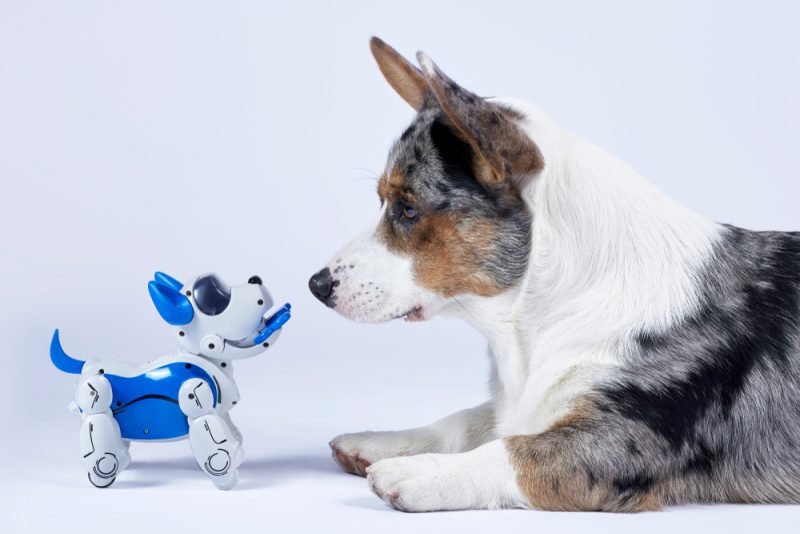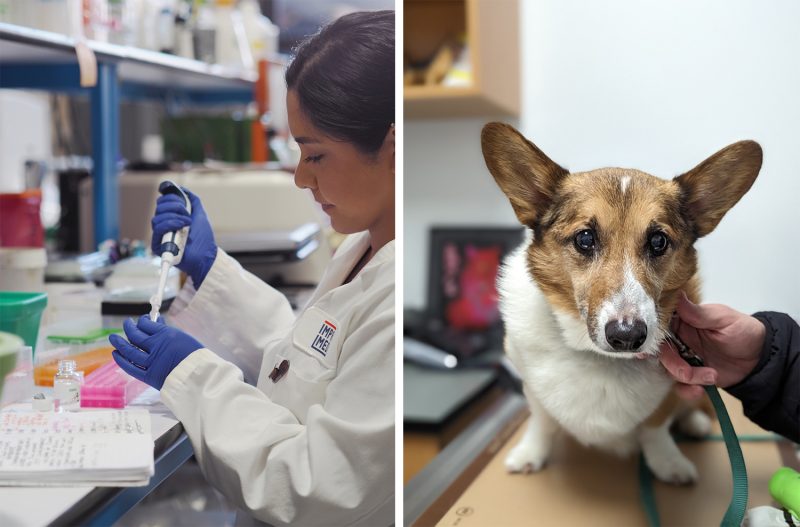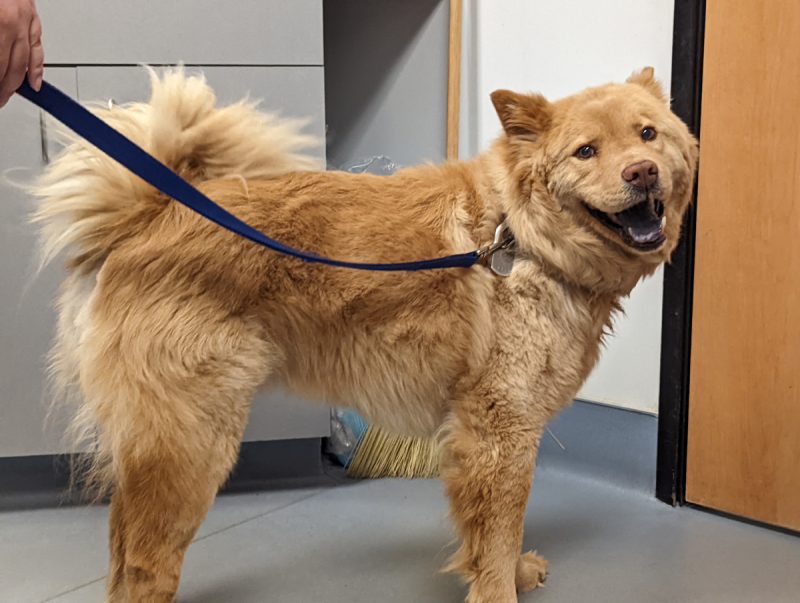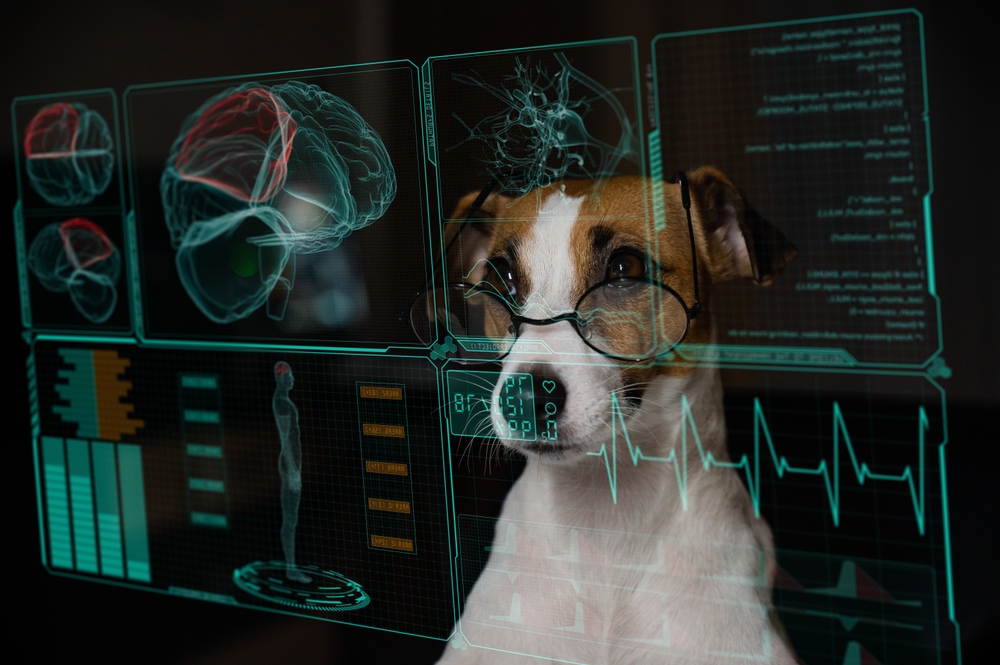Hi, I’m Dr. Karyn! Read my introduction to learn more about me and my five funny dogs, Poppy, Bailey, Kodah, Ned, and Fred.
Cancer – it’s a word we hope never to hear, but one that we almost certainly will, at least once in our lifetime. In dogs, cancer can take many forms, but thanks to advancements made in both human and veterinary medicine, our treatment options are growing every day. Although chemotherapy has been around for decades, I was recently introduced to the team behind a pretty incredible new technique that is using artificial intelligence to create individualized treatment protocols for dogs.
Before we get stuck into what I learned about this amazing technology, I need to be upfront about something:

I Hate AI
As someone who grew up watching I, Robot (and reading the book), Battlestar Galactica, Terminator, and, well, A.I. (creepy robot Haley Joel Osment – shudder!) I am perplexed by the fact that we are so happily (and sometimes unwittingly) welcoming AI into our lives. Even as I type, I have to brush away Gemini’s offer to summarize or “polish” my work with the same level of irritation and disdain with which I would brush away a mosquito or fly. Mind you, I initially thought it was offering to translate my text into ‘Polish,’ which I thought was a bit odd; something about my surname, perhaps? But I digress.
As a vet, I worry about how deeply AI is invading the information being taught to unwary students and being shared and accessed by owners desperate to find answers online. AI might be able to digest and regurgitate this sort of information on command, but it can never replace the nuance of experience or think outside the box, something that is often needed in veterinary care.
As a writer, I am frustrated to see talented individuals being usurped by clunky imitations, knowing that these ‘unpaid authors’ will soon have absorbed enough to be indistinguishable from the real thing. At the moment, I still catch glimpses of Joey from Friends and his “humid prepossessing Homo Sapiens with full sized aortic pumps.”
Artists, photographers, designers and other creatives are finding themselves out of work, unable to compete with the sheer volume of ‘almost’ perfect creations that AI can churn out, without the pesky need to worry about paying for food, clothing, housing, etc. It seems to me that, instead of making our lives easier, AI is steadily sucking the joy and authenticity from them.
But when I spoke to Dr Ilona Holcomb and the team at ImpriMed, I discovered how they have created a new way to beat cancer that simply wouldn’t be possible without artificial intelligence. Before I go into the details, let’s look at a quick summary of how chemotherapy works (a summary I wrote without the help of AI, thank you very much!).
What Is Chemotherapy?
Strictly speaking, chemotherapy refers to a treatment that uses potentially harmful chemicals to kill or suppress harmful cells. These cytotoxic chemicals target rapidly dividing cells, with neoplastic (cancerous) cells typically being the fastest-growing cells in the body. The problem with chemotherapy is that it doesn’t differentiate between neoplastic and non-neoplastic cells, so other rapidly dividing cells can also be targeted, with hair follicles, bone marrow, and mucous membranes being at the top of the list. This is why we often see hair loss, anemia, immunosuppression, mouth ulcers, vomiting, and diarrhea in patients receiving chemotherapy.
In humans, the aim is to eradicate cancer completely, and these side effects are often tolerated, suffered, and managed as part of that process. When it comes to our pets, exposing them to such horrific effects would be cruel, as they can neither understand why it is happening, nor consent to the treatment. Instead, we reach a compromise whereby we use drug doses that have little or no significant side effects, but we rarely achieve a complete cure. There are those lucky cases where the cancer is completely eradicated, but it is more common that we buy a few more good months or years with our dog.
Chemotherapy may be used on its own or in combination with other forms of treatment, such as surgery or radiation therapy. In dogs, it is most commonly used to treat lymphoma, leukemia, high grade mast cell tumors, and bladder tumors.
Chemotherapy Drug Selection
Traditionally, samples taken from your pet – blood, bone marrow, tissue or cell samples – are used to make a more specific diagnosis of the type and stage of neoplasia we are dealing with. Based on this information, a treatment protocol is created using the chemotherapy drugs that tend to work against that type of cancer.
This Is Where It Gets Exciting
A relative newcomer to the world of human and veterinary medicine, ImpriMed is a diagnostic service that utilizes artificial intelligence to test the neoplastic cells from individual patients – both human and pet – to formulate a chemotherapy drug protocol that will be most effective, not just against the type of cancer, but specifically against your dog’s cancer.

How Does It Work?
When we deal with infection, the best way to ensure we use the best treatment is by running a culture & sensitivity. A sample of the infected cells is grown in a lab so that the pathogen (bacteria or yeast) can be identified, and then different antimicrobial treatments are applied to see which is the most effective at eradicating the pathogen. This way, we know exactly what we are treating, and we start with the right antibiotic first time, instead of trying different drugs until we find one that works.
In a similar – but much more complicated – way, the AI program pioneered by ImpriMed isolates and identifies the cancer cells and runs them through multiple drug combinations to find out which ones work best. Additionally, this technology is able to detect and predict how different cell lines may emerge, factoring this into the treatment formulation.
The result is a chemotherapy protocol that we know, before even starting treatment, your dog’s cancer will respond to, completely removing the guesswork, trial and error, and drug substitution that is a common feature of traditional chemotherapy. This technique requires no more sampling than would ordinarily form part of your dog’s chemotherapy treatment and takes about 1 week to formulate a personalized prediction profile of their cancer.
The thing that really stood out to me when talking to Dr Holcomb was that she is clearly an animal lover, and is genuinely interested in making this tech accessible to everyone. The company has largely absorbed most of the research & development cost in order to offer their service at the lowest price they can, and I truly hope that they are able to continue the work in this way. It’s so hard to find an ethically-run biotech company that genuinely prioritizes patient care.

What Can’t It Do?
While this technology sounds incredible – and it is – it’s important to understand what it can’t do.
- It is not a treatment for cancer – ImpriMed does not treat your pet or provide chemotherapy drugs. They provide the recipe of drugs that need to be given.
- The chemotherapy protocol created with AI does not necessarily increase the chances of a cure. However, by starting treatment with the right drugs, those chances can only be increased. Additionally, by using chemicals that we know the cancer cells are sensitive to, we may be able to use lower doses in patients that are quite sensitive to treatment, or even higher doses in more resilient dogs to increase our chances of remission or cure.
- At this stage, only canine lymphoma and leukemia, plus feline lymphoma, can be tested. However, there are already plans underway to extend this into other common cancers seen in cats and dogs, such as mast cell tumors.

I Hate Most AI
So it seems I’ve found an exception to my rule.
It may not be the golden ticket that ends all cancer, but with the help of artificial intelligence, it feels one step closer. For better or worse, AI is fast invading every facet of our lives, sometimes without us even realizing it. While its contributions to arts and literature are unwelcome, the unparalleled processing and problem-solving capacity it wields cannot be denied.
What I can tell you, with total honesty, is that if one of my pets is diagnosed with ‘the big C,’ I will be looking to ImpriMed for help.
(No, they didn’t pay me to say that. I am genuinely impressed by the company!)

- Read her previous article: Dog Crates Are For Lying On: Kodah in the Window
- Read her next article: Jumping Chihuahuas: Ned Finds a Loophole
Featured Image Credit: Reshetnikov_art, Shutterstock























